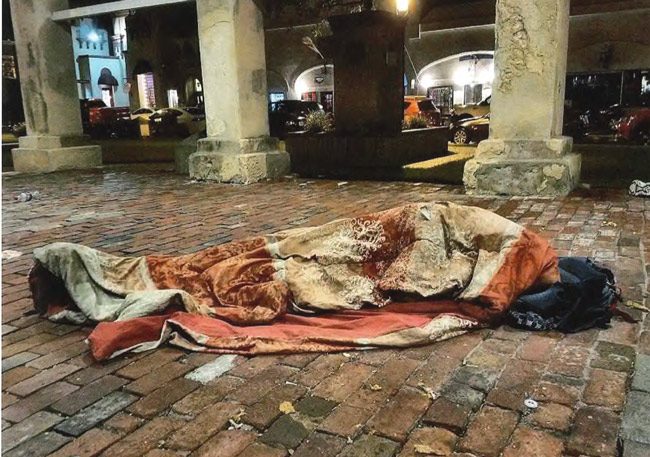
By John Tharp and Maria Foscarinis
When San Diego resident Gerald Stark’s rent increased and he couldn’t afford another apartment, the retired union pipefitter moved into his RV.
But because he lacked an address, San Diego law made it almost impossible for him to park his RV legally. Soon the city confiscated it, leaving him out on the streets.
There, he was ticketed for violating another law prohibiting sleeping in public. Faced with thousands of dollars in fines and fees he was unable to pay, Stark lived every day in fear of being arrested — for simply trying to survive.
He’s not alone.
There isn’t a single county in the United States where you can rent a two-bedroom, market-rate apartment working a full-time, minimum-wage job. Many of our neighbors are just one emergency or missed paycheck away from losing their homes.
Unfortunately, law enforcement is often used as a first response to address homelessness. Many communities essentially criminalize it.
Instead of connecting people with services and housing, they drag people experiencing homelessness into the criminal justice system, making it more difficult for them to get a job or housing.
It’s a harmful myth that homeless people cause an increase in crime. Several studies show homeless people are actually more likely to be victims of crime — especially in places where they have to hide from police.
 In the absence of low-cost housing, many people often have no choice but to break the law to carry out necessary, life-sustaining activities — like sleeping, resting, or using the bathroom — in public places. But instead of responding with solutions, cities like Denver, Houston, and Puyallup, Washington are enacting more laws against those activities.
In the absence of low-cost housing, many people often have no choice but to break the law to carry out necessary, life-sustaining activities — like sleeping, resting, or using the bathroom — in public places. But instead of responding with solutions, cities like Denver, Houston, and Puyallup, Washington are enacting more laws against those activities.
Such laws are harmful, wasteful, and arguably unconstitutional.
Cities spend taxpayer dollars enforcing homeless encampment “sweeps” and “move along” policies for homeless people. And burdening homeless people with fines and fees makes it even more difficult for them to return to the tax rolls.
One homeless man, Russell Bartholow of Sacramento, received an astonishing $100,000 in fines for sleeping and camping in public. Fining people who don’t even have enough money for rent isn’t productive or humane.
Homelessness is a community issue, and it demands a community to solve it.
At the federal level, a universal voucher program, where no person pays more than 30 percent of their income on rent, would go a long way. Currently, because of funding cuts spanning almost four decades, only one-in-four of those poor enough to be eligible for federal housing help actually receives it.
Those who do are often turned away due to discrimination. We must strengthen federal anti-discrimination laws, so housing can’t be denied to someone due to their source of income, poor credit, lack of rental history, or their status as a victim of domestic violence.
At the local level, tenants in good standing should be protected from arbitrary eviction, and low-income people facing eviction should get a right to counsel.
And all laws that make it a crime to be homeless should be repealed.
Philadelphia offers an example. Earlier this year, law enforcement officials donated a vacant office in the subway station to create the HUB of Hope, where homeless people can do their laundry and stay out of bad weather. “We are not going to arrest people for being homeless,” said Major Jim Kenney.
In Syracuse, Mayor Stephanie Miner refused to follow a state order to arrest homeless people who didn’t enter shelters. Instead, the city reached out to people experiencing homelessness to connect them to housing, helping Syracuse become one of the first cities to end veteran homelessness.
With proven solutions, communities can help people like Gerald Stark, Russell Bartholow, and millions of others off the streets and onto a better path, leaving everyone safer and healthier.
![]()
Maria Foscarinis directs the National Law Center on Homelessness and Poverty. John Tharp is a former sheriff of Lucas County, Ohio. The Economic Hardship Reporting Project produced this piece, a longer version of which appeared at The Huffington Post.






























Dave says
I love it ! Too many people look down on our homeless and some even fear them. Please stop arresting our homeless and let’s help them get the help and supplies they need to survive.
Mary R says
We shower our “under privileged” children with presents galore at Christmas. Almost every church, school, club, office, community building, stores have a tree for people to donate gifts. While that’s kind and generous, we have adults starving, no place to find shelter, food, necessities to survive. We need to get action groups and force our elected officials to find a solution, most local governments have vacant offices and most communities have goodwill volunteers that will help organize teams to find adequate and decent donations so people have a place to sit, sleep, eat, bathe. Shameful we’re so negligent caring for the homeless.
south florida says
Being homeless can happen to anyone. Everyone is a paycheck away from loosing their homes unless you are a big wig.
FlaglerRedo says
Bring Back the Poor Farm
capt says
South Fla said it best ” Everyone is a paycheck away from loosing their homes unless you are a big wig.”
So true. Bill collectors don’t care about your problems they want your money.
Also We have Vets on the street, these men and women signed up to defend the United States of America because they thought it was right, a lot of these people lost their jobs, lost their wife’s, their homes, their cars and a lot find themselves homeless. And the govt fails to take care of those that signed up to take care of the United States in a time of need.
Born and Raised Here says
With all these rentals perhaps we could put them in the rentals, and give us owners a credible discount on property taxes.
Realist says
I know everyone gets all warm and fuzzy feeling inside when they think about helping these people. There is a large majority of homeless that will be homeless no matter what you do for them. They either don’t want to work or do not have the mental capacity to work and maintain themselves even if they are given the help to “get back on their feet”. Some of them collect a check from the government and just drink it away. A vast majority of homeless suffer from mental illness. It’s sad, but true. That being said I don’t want to drive around town and see them sleeping on sidewalks and holding signs in traffic. Pissing and shitting on the side of the road in homeless camps near the places our children play or frequent. Places like the Palm Coast library. Walk 5 feet in the woods anywhere around there and look at all the trash and litter they leave behind. The drunken fights that law enforcement has to deal with almost daily. The more services or free food and shelter you offer the more they will flock here.
jake says
@south florida & capt, “Being homeless can happen to anyone. Everyone is a paycheck away from loosing their homes unless you are a big wig.”
Nonsense, many people own their homes, are financially secure, and responsible adults. Being homeless can be a financial issue, however more often than not, it’s about mental illness.
Sherry says
OK. . . then maybe what we should do is decriminalize mental illness.
Regardless of the “label” you put on the growing problem, as what should be a “civilized” society, we should be looking for humane solutions instead of locking people away. Florida has very little in the way of facilities for treating mental illness. We should be ashamed that many of the homeless are veterans. . . forgotten by the VA, and forgotten by their families.